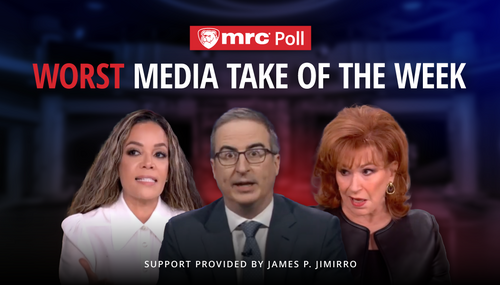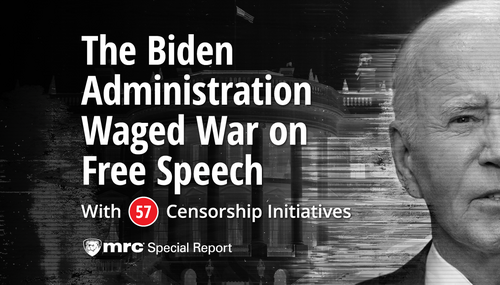Sunday night, Matt Drudge characterized a lengthy Sunday evening Washington Post report by John Wagner, Abby Phillip and Jose A. DelReal set to appear in Monday's paper as an assertion that "CLINTON (HAS) ALREADY WON!"
That's only a slight exaggeration. The theme of the trio's report is that Clinton has a secure enough lead that the campaign faces two pleasant options: nail down battleground states by larger margins or try to "expand her efforts to states that Democrats haven’t won in a generation." But based on the paper's own joint poll with ABC News, the piece's entire premise is flawed. That poll shows Mrs. Clinton with a four-point, 47 percent to 43 percent October 10-13 lead — hardly a landslide, and the exact reading seen in the Post's July 11-14 poll.
On Fox News Sunday, host Bret Baier couldn't have known that morning of the Post's planned evening report when he spoke with Democratic vice-presidential nominee Tim Kaine.
But he did know about the October and July Post/ABC polls, and he asked Kaine about their identical readings three months apart:
BAIER: As Hillary Clinton takes time off the trail to prepare for the debate, there are plenty of unanswered questions about the newly released WikiLeaks e-mails surrounding her campaign.
We spoke earlier this morning with vice presidential Democratic nominee, Virginia Senator Tim Kaine.
(Begin Pre-recorded interview)
BAIER: Senator, thanks for being here.
I want to put up the latest poll from Washington Post/ABC. It is essentially exactly where this poll was before the convention, 47 to 43. Judging from all the things that you and Secretary Clinton are saying on the trail about how unacceptable Donald Trump is, why do you think this poll is so close, within the margin of error, actually?
SEN. TIM KAINE, D-VA., VICE PRESIDENTIAL NOMINEE: Bret, yeah, it is close. And I’ll tell you, I’m used to this. I’m from Virginia. All of our races are close. I’ve been saying from the beginning that I thought this would be a close election.
So, it doesn’t particularly surprise me. We are seeing some data about voting, whether it’s registrations, early voting, and request for absentee ballots in key battleground states that we like. But I’m down in South Florida campaigning yesterday and today because Florida is close and there’s so many other close states. We have to assume that’s the case, and I think it’ll be the case right up to the end. ...
Note that Kaine didn't really answer the "why" question. To explain why, he'd have to rationalize how the supposedly inevitable Mrs. Clinton hasn't been able to improve her standing in three months against a supposedly unfit and "unacceptable" opponent, despite having the establishment press so obviously serving as a de facto arm of her campaign. If I were Kaine, I wouldn't have answered the question either.
So where is the Post coming up with this idea that Team Clinton can either win battleground states big or pick off a few red-state strongholds, but still be confident of victory either way? Their weird answer — weird this year for sure — is money:
The issue is predominantly about resources. Clinton and the Democratic Party entered October with twice as much money in the bank as Trump and the Republicans, but some in Clinton’s camp have cautioned against any late moves that could jeopardize a victory in states she appears to have nailed down.
“We’ve got to get our win,” said a senior Clinton aide, who spoke on the condition of anonymity to discus the campaign’s strategy. “We have to make sure we focus on keeping the pressure on and doing the things we need to build up as many electoral votes as we can.”
The campaign is expected to decide in the coming days whether to make a more aggressive play for states such as Georgia, which is being eyed as one of the more promising opportunities for Clinton, and Arizona, where a couple of high-profile surrogates are being deployed this week: Sen. Bernie Sanders (Vt.) on Tuesday and Chelsea Clinton on Wednesday.
Meanwhile, the Trump campaign is not willing to concede publicly that any states on the map are lost, maintaining that Clinton’s low favorability ratings and Trump’s anti-establishment message will push undecided voters and independents to break for Trump in the final leg of the campaign.
“We’re seeing a much more competitive contest than you’re analyzing them to be. We’re still playing a very active role in these states and obviously making as big of a play as possible,” said Trump spokesman Jason Miller. “There isn’t anything that’s not a priority. We don’t want to isolate it and say, everything comes down to these states.”
(Aside: Am I only one who has hard time imagining Bernie Sanders or Chelsea Clinton successfully revving up voters in Arizona?)
This isn't to dispute the contention that Mrs. Clinton appears to be ahead nationally at the moment — emphasis on "appears," because, as I have explained before, current polling efforts, which typically get completion rates of between 8 percent and 10 percent, miserably failed to predict election results in 2014 and 2015.
What the press, and apparently the Clinton campaign, still fail to grasp is that money hasn't been a particularly relevant factor in this campaign. Donald Trump got nominated while spending almost nothing. Though his campaign has less money in the bank, it reportedly has received more individual contributions from Republicans (2.6 million) than any other GOP campaign in history.
After the beating Trump has taken in the past ten days, the fact that he is no worse off than he was three months ago, at least as far as the Post/ABC poll is concerned, has to have the Team Clinton reaching for their antacid tablets, despite their public posturing.
For all the opprobrium being thrown his way, Trump is the still the primary subject of the national conversation and still dominates news reports far more than Mrs. Clinton. Thus, unlike any other perceived as trailing major party candidate in recent memory, he may have the built-in visibility to regain and build needed momentum (still a very tall order). But with Mrs. Clinton, the general rule going back over 20 years has always been that she "has a habit of being less popular the more she's seen."
The other factor we won't really know much about until after the election are the two campaigns' ground games. The conventional wisdom says that Trump's is terrible, and that Team Clinton has a well-oiled machine. Perhaps, but if rally enthusiasm translates into ground support, Trump may be better off than assumed, and Mrs. Clinton, whose rallies have had much lighter attendance, does not have as much of a built-in advantage as most people believe she does.
As for the posturing at the Washington Post, the folks at Instapundit continually remind us, we have to think of establishment press outlets "as Democratic operatives with bylines, and it all makes sense." In this case, the Post's report appears to be designed to discourage Trump-supporter turnout. In this topsy-turvy year, it might backfire and cause Mrs. Clinton's relatively unenthused supporters to find something better to do than show up at the polls.
Regardless, the real story here is the Post's clear attempt to make something approaching finality out of almost nothing.
Cross-posted at BizzyBlog.com.




